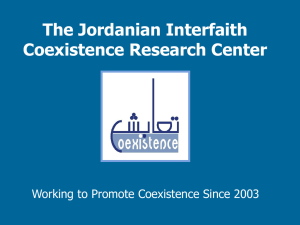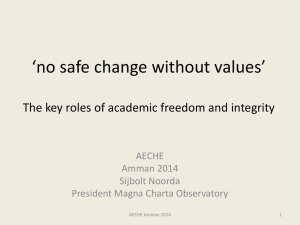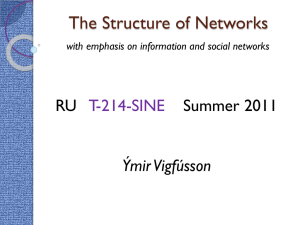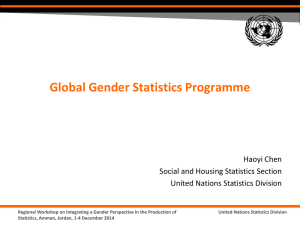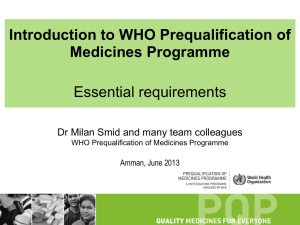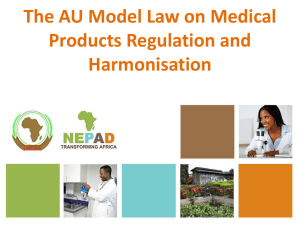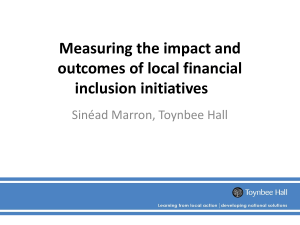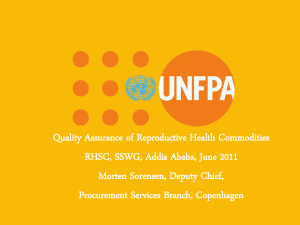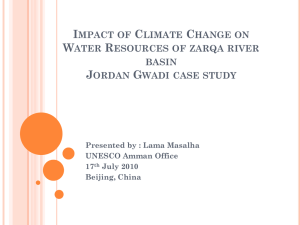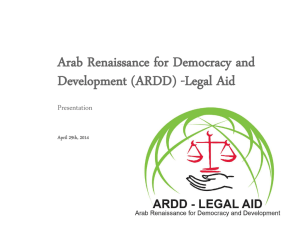Introduction to WHO Prequalification of Medicines Programme
advertisement
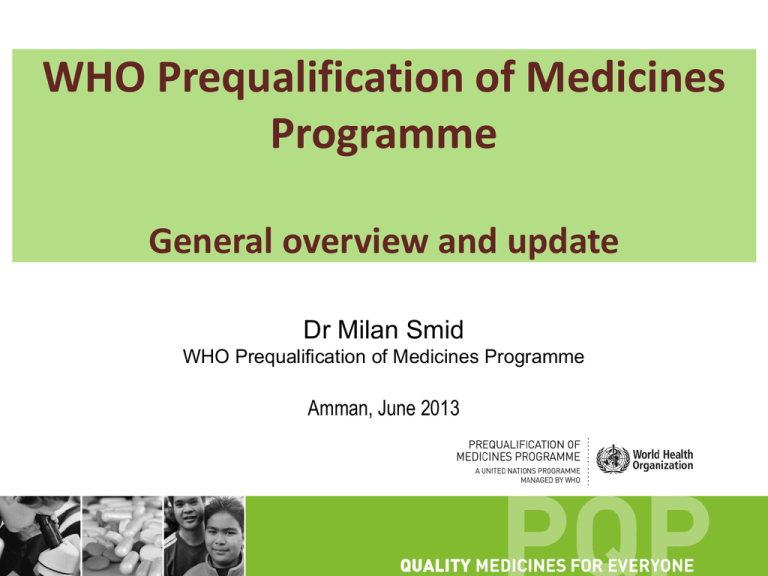
WHO Prequalification of Medicines Programme General overview and update Dr Milan Smid WHO Prequalification of Medicines Programme Amman, June 2013 UN Prequalification Programme for Priority Essential Medicines Action plan of UN from 2001 for expanding access to selected priority medicines Objective: • To ensure quality, efficacy and safety of medicines procured using international funds (e.g. GFTAM, UNITAID) to serve patients in developing countries Components: • Evaluation of Quality, Safety and Efficacy of prioritised Essential medicines (FPPs and APIs), inspections of manufacturers and monitoring of the products after their prequalification. • Prequalification of quality control laboratories. • Building capacity of regulators, manufacturers and quality control laboratories. Amman, June 2013 2 Categories of medicines invited • Primary categories of medicines: – HIV/AIDS – Malaria – Tuberculosis • Later added: – – – – Reproductive health Influenza Acute diarrhoea Neglected tropical diseases • Potentially other categories of products, if there is the need • Prequalification also applicable for APIs! • Published in invitations for Expression of Interest (EOI) on Prequalification website Amman, June 2013 3 Example - invited SL TB medicines (1) Amman, June 2013 4 Two prequalification routes Invitation for expression of Interest Medicine not assessed by SRA Medicine assessed by SRA Dossier and SMF submitted for assessment and accepted Valid for innovators and generics WHO assessment and inspections organized Compliance SRA registration (assessment and compliance check) Simplified review Prequalification Acceptance Post-PQ maintenance Amman, June 2013 5 Essential steps of PQ evaluation procedure • Need is specified and agreed by WHO treatment programmes • Invitation for Expression of Interest (EOI) is published • Interested parties submit dossiers • Dossiers receive initial screening • Full dossiers are assessed • Inspections are conducted at manufacturing sites and at CROs • Samples are tested, if needed • If outcome is positive, pharmaceutical product is listed on the website, including product information (SPC, PIL), assessment report (WHOPAR) and inspection report (WHOPIR) Amman, June 2013 6 Essential steps of monitoring of PQ product • Variations to the dossier of prequalified product • Sampling and Testing • Re-inspections • Requalification • Management of complaints • De-listing or suspension (if and when appropriate) Amman, June 2013 7 Standards • WHO standards as defined in WHO guidelines and International Pharmacopoeia are applied in prequalification process • If these not exist, ICH guidelines are applied • In case of need, guidelines of stringent regulatory authorities, which are involved in ICH process • Pharmacopoeias (Ph.Int., USP, BP, Ph.Eur., JP) as minimum standard • Depending on product, assessors may ask for additional tests or tightening limits • Same principles applied in prequalification as valid for national regulatory approvals by stringent authorities Amman, June 2013 88 WHO guidelines and monographs Medicines related guidelines: http://www.who.int/medicines New or revised: http://www.who.int/medicines/areas/quality_safety/quality_a ssurance/projects/en/index.html Many opened for comments! Guidelines relevant for WHO prequalification: http://www.who.int/prequal/info_applicants/info_for_app licants_guidelines.htm Amman, June 2013 9 Evaluation procedure Assessment of product dossiers (Quality specifications, pharmaceutical development, production, control, stability, bioequivalence etc.). Teams of professionals from national Drug Regulatory Authorities (DRA): Including Brazil, China, Canada, Denmark, Estonia, Finland, France, Germany, Hungary, Indonesia, Malaysia, Philippines, Spain, South-Africa, Sweden, Switzerland, Tanzania, Uganda, UK, Zimbabwe ... • • • • Copenhagen assessment week 8 to 20 assessors together during one week at least every two months at UNICEF in Denmark Every dossier is assessed by at least four assessors. An assessment report is issued - signed by assessors Letter summarizing the findings and asking for clarification and additional data if necessary is sent first by e-mail to the applicant followed by surface mail Amman, June 2013 10 Inspections • Team of inspectors for each inspection • WHO PQ inspector plus PIC/S member country plus local country inspector (observer) • Some cases – capacity building (recipient country) • Inspections are product oriented • APIs and Bioequivalence studies inspected based on risk assessment • Public inspection report is posted on PQP website Amman, June 2013 11 Outcomes of PQ procedure Information in public domain: http://www.who.int/prequal/ • • • • • Lists of PQ medicinal products WHOPAR (SPC, PIL, labelling) WHOPIR (both FPP and API) Notices of Concern and Suspensions Information on progress of assessment procedure and inspections • Supportive documents: WHO guidelines, description of PQ procedure, training materials Amman, June 2013 12 www.who.int/prequal Amman, June 2013 1313 Prequalified 425 medicines (March 2013) Amman, June 2013 14 Prequalified 425 medicines (March 2013) 99 medicines listed based on the - approval and/or tentative approval by US FDA (95) - approval within Canada's Access to Medicines Regime (1) - approval by EMA according to Article 58 (3) Amman, June 2013 15 Prequalified medicines according to countries of manufacture (December 2012) Amman, June 2013 16 Producers of WHO prequalified FPPs 4.5.2013 Amman, June 2013 117 Capacity building - objectives • Good quality submissions for PQ supported by compliance with "good practices" – Platform for improvement of drug development, manufacturing, documentation and quality control • Fast regulatory approvals of PQ medicines in recipient countries – Technical education of regulators as a platform for strengthening expertise, regulatory efficiency and networking • Reliable quality monitoring – Technical education of staff of QCLs to strengthen expertise, effectiveness of quality monitoring and networking PQP standards and PQP example support strengthening of regulatory systems and capacity of manufacturers in general Amman, June 2013 18 Amman, June 2013 19 Amman, June 2013 20 Technical Assistance • Provision of expert consultants to – Manufacturers, Quality control laboratories, Regulators • Assistance focuses on – GMP, GCP or GLP compliance – Dossier development • Assistance is separated from the assessment / inspections and may be followed by specific trainings • Collaboration with partners, who organize free of charge assistances with the objective to accelerate submissions of good quality application and GMP compliance Amman, June 2013 21 Amman, June 2013 222 Countries assisted by PQP 2006-2012 Amman, June 2013 223 API Prequalification Intended for: UN agencies, National medicine authorities, FPP manufacturers, public • API Prequalification is a programme run by the WHO to assess the Quality of listed APIs (HIV/AIDS, TB, malaria, RH) and GMP status of API manufacturers. • Prequalified APIs are publicly identified on the WHO website as suppliers of quality API. • There is no FPP involvement in this process. • Project has multiple benefits for manufacturers of FPPs and APIs and regulators. Amman, June 2013 24 Producers of WHO prequalified APIs 3.5.2013 Amman, June 2013 225 Expert review panel (ERP) process for risk categorization of medicines to assure quality for procurement needs • Eligibility: a. FPP manufacturing site is GMP compliant as certified by WHO PQP, SRA or PIC/S inspectors. b. In case of medicines invited for WHO-PQP, a product dossier has been accepted for assessment Amman, June 2013 26 Expert review panel (ERP) process - risk categorization serving procurement needs • The following major product attributes are used as the basis for risk categorization (assuming the eligibility criteria are met): a. FPP manufacturing process and FPP specification b. Stability data c. Evidence of therapeutic equivalence d. API source and API quality Amman, June 2013 27 ERP - possible outcomes of review • Risk category 1: "No objection" against procurement • Risk category 2: "No objection" against procurement, but there are certain observations • Risk category 3: "Objection" against procurement, but still acceptable in case of extreme need • Risk category 4: "Objection" against procurement, not recommendable at all • Request for additional data Amman, June 2013 28 ERP - possible outcomes of review • Recommendations are provided within 6-8 weeks and are time limited: • validity maximum 12 months. • can be extended only under certain circumstances • ERP status does not replace WHO PQ or SRA approval but should be seen as a step towards WHO PQ/SRA approval Amman, June 2013 29 WHO Collaborative Procedure to accelerate registration of prequalified medicines Procedure drafted in wide consultation, approved by WHO advisory expert committee. Approved by WHO Executive Board in May 2013. Pilot testing ongoing with 11 interested countries: • Botswana • Nigeria • Ethiopia • Tanzania (incl. Zanzibar) • Ghana • Uganda • Kenya • Zambia • Kyrgyzstan • Zimbabwe • Namibia www.who.int/prequal/info_press/documents/CollaborativeRegistration_16 November2012.pdf Amman, June 2013 30 Principles of proposed process 1. Procedure voluntary for manufacturers and NMRAs and providing benefits to both parties. 2. Being asked by PQP holder (manufacturer), PQP shares full PQP assessment and inspection outcomes with interested NMRAs and provides advice to facilitate national regulatory decisions (registrations, variations, withdrawals). Applicable only for medicines assessed by PQP. 3. No interference with national legislation, decision making process and regulatory fees – availability of PQP expertise. Amman, June 2013 31 Principles of proposed process 4. Co-operation among PQP holder (manufacturer), NMRA in interested country and PQP necessary to overcome confidentiality issues, assure information flow and product identity. Registration dossier in countries in principle the same as approved by PQP. 5. Each participating authority commits to adopt registration decision within 90 days from having available full PQP assessment and inspection outcomes and has the right to – – decline to adopt procedure for individual medicines decide differently from PQP, but keep PQP informed and clarify the reasons for deviation. Amman, June 2013 32 Steps of the procedure: agreement Interested NMRAs agree to participate in the procedure and designate focal persons PQP lists committed NMRAs on its website and gives to focal persons access to restricted-access website Amman, June 2013 333 Steps of the procedure: registration PQ product is submitted for national registration to NMRA participating in the procedure NMRA is informed about the interest to follow PQP Manufacturer informs PQP about national submission and gives consent with information sharing Participating NMRA confirms its interest to participate in procedure for specific product PQP shares with participating NMRA outcomes of assessment and inspections Participating NMRA reviews WHO PQP outcomes, decides within 90 days decides upon the national registration and informs PQP about its decision Amman, June 2013 334 Steps of the procedure: post-registration Variations PQP informs NMRAs about important variations NMRAs inform PQP about variations and decisions leading to inconsistency with PQP conditions De-registrations and de-listings WHO PQP informs NMRA about withdrawals, suspensions or de-listings of prequalified medicinal products NMRAs inform PQP about national de-registration Amman, June 2013 335 Major and other new developments • Pre-inspection GMP assessments with public outcome - if compliance confirmed • New guidelines proposed e.g. in GMP area, quality data requirements for prequalification, post-prequalification variations • New monographs in International Pharmacopoeia • Prequalification fees considered for the future Amman, June 2013 36 Frequent misunderstandings • Manufacturers/manufacturing sites are prequalified • PQP issues WHO GMP certificates • PQP provides direct financial support • Prequalification gives right to succeed in tenders • PQ substitutes national authorization (registration) in recipient countries • All medicines used in treatment of HIV/AIDS and tropical diseases are invited for PQ • Prequalified medicines may bear WHO logo Amman, June 2013 37 Potential benefits from participation in WHO-PQP for manufacturers • Participation in tender procedures organized by international procurers and financial profit • Recognition as being WHO listed company • Facilitated registration in some recipient countries • Reduction of inspections from recipient countries • Possibility to be assisted by expert consultants (GMP, dossier) • Learning process improving company's chance to succeed with submissions to SRAs • Recognition of prequalified APIs Amman, June 2013 38 For some applicants WHO prequalification is difficult. Why? • • • • • • Wrong paradigm of generic product development Compliance with good manufacturing practice Reliable source of good quality raw materials Inappropriate process and product control Lack of comparability with reference product Difficulty to assure complementary functions relevant for development and production of generics (bioequivalence, comparator, standards, …) Amman, June 2013 39 39
